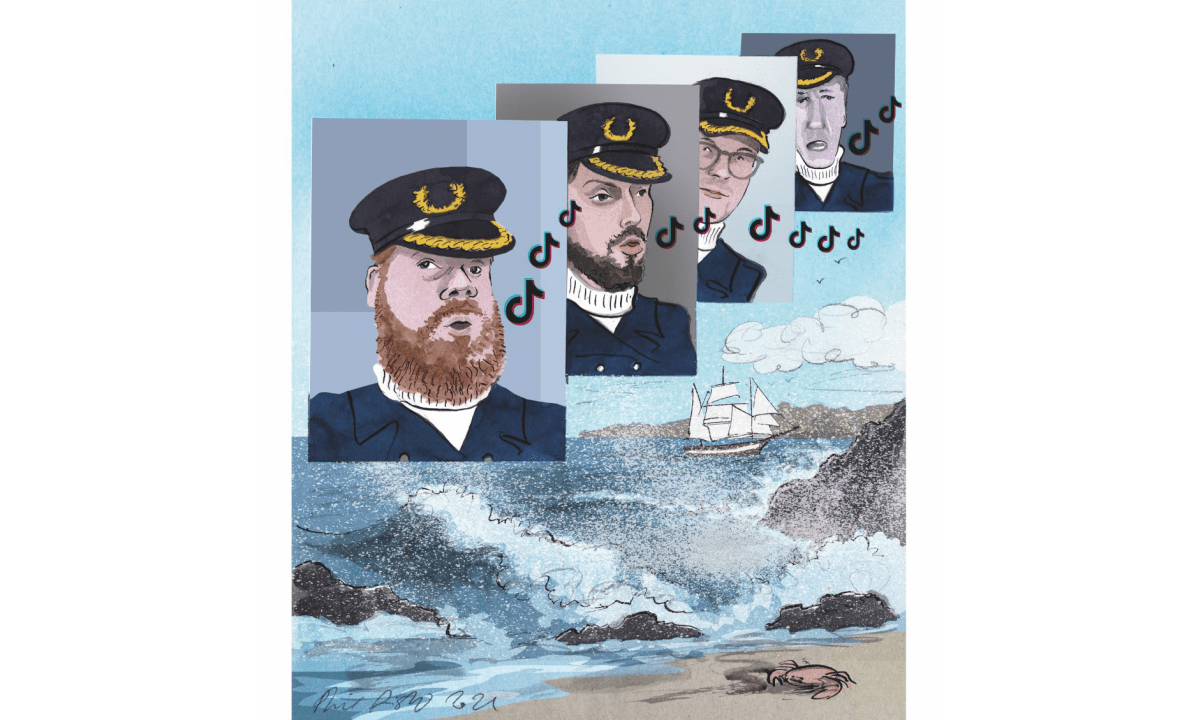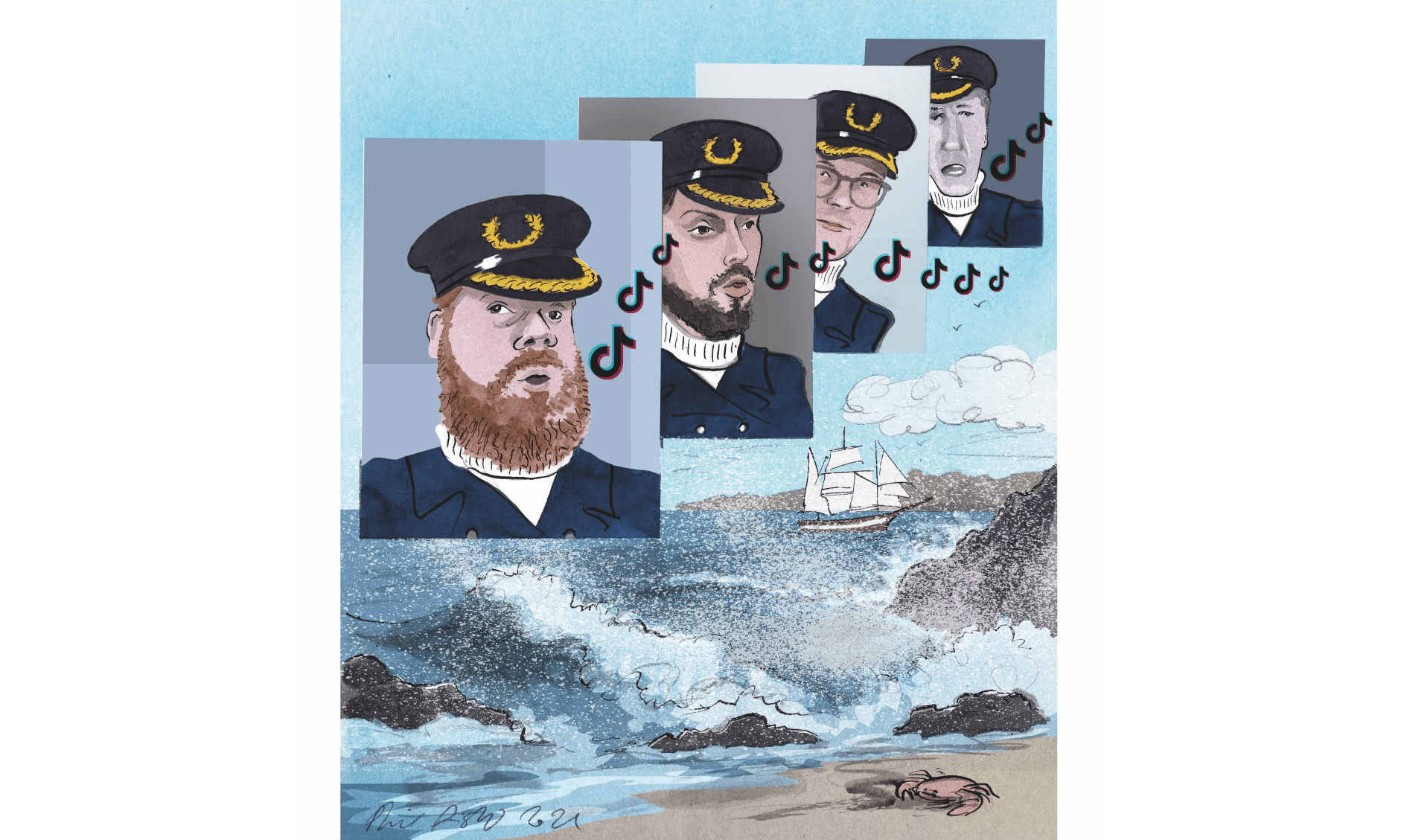Many things are now normal that would have seemed unlikely a year ago. But even in this strange new world the sudden rise of the sea shanty is, perhaps, strangest of all.
It all started in December when Nathan Evans, a postman from North Lanarkshire, posted a video of himself online — a lone figure filmed in no-frills close-up, hoodie high under the chin, beanie pulled down to the eyes — singing the 19th-century whaling song ‘Wellerman’. A trickle of views became a storm, thousands turning to millions (now billions) and just like that sea shanties went from kitsch, Last Night of the Proms novelty to global phenomenon. The song went viral — the centre of a new internet craze: #ShantyTok.
Fast forward a few months and Evans, whose song went to No.1 in the UK charts this week, has signed a three-album deal with Polydor, while Bristol-based folk group the Longest Johns (whose arrangement Evans covered) have a record deal with Decca. Everyone from John Legend to Jon Snow has joined the online obsession, and the song has been remixed in every genre from heavy metal to electro-dance; there’s even a ‘Wellerman’ fugue. So what exactly are we to make of this unlikeliest of musical trends?
The history of the sea shanty is a curious one, not least because it’s a tradition that has spent longer on land than it ever did at sea. Greek poet Pindar, author of the earliest surviving account of the legend of Jason and the Argonauts, lists first among the crew of the Argo none other than Orpheus ‘father of songs’, whose chants set the rhythm for the rowers, while a model of an Egyptian boat from 2,000 BC in New York’s Metropolitan Museum includes a musician facing the crew. Similar examples from Bronze Age carvings, Viking history, from Herodotus and Thucydides add weight to the ancient roots if not precisely of the shanty, then certainly the shantyman, whose job was to lead and synchronise sailors through song.
Shanties are a symbol of the temporary, fragmented, partial world they come from: the Atlantic
The term ‘shanty’ itself (or ‘shantey’ or ‘chanty’) didn’t make its way into dictionaries until the mid-19th century. The etymology is cloudy; it might be a corruption of the French ‘chantez’ or it could come from the shanties or shacks that housed Africans transported to the West Indies in the slave trade. Either way, the date reflects the genre’s brief heyday — the golden age of commercial shipping and travel — as Gerry Smyth, author of the newly published Sailor Song, a history and collection of shanties, explains: ‘After the end of the Napoleonic Wars various new trade routes opened, particularly from Britain to America’s eastern seaboard. These were commercial concerns, so the margins were tight. While technology was improving and ships were getting bigger and faster, larger crews didn’t make sense financially. The vessels were still wind- and muscle-driven, so the best way to keep costs down was to have efficient, knowledgeable crews working at maximum capacity. That’s where the idea of shanties emerged, because work was facilitated and expedited by them.’
Crucially, Smyth stresses, the shanty was very much a phenomenon of merchant ships. The navy had their own systems in place, work rhythms organised by rules and whistles — a top-down structure that contrasts tellingly with the more organic, grass-roots shanty tradition that was accommodated and fostered by owners because of its obvious benefits. So both the shanties themselves and the liminal figure of the shantyman — one of the men, but spared hard labour and given better rations than his colleagues, Orpheus in oilskins — sit ambiguously in terms of control, ownership.
There’s no doubt at all, however, about the function of the songs, which evolved and were adapted for the rhythms of very specific on-board actions. Sailing labour was broadly divided into pushing and pulling tasks — heaving and hauling, in sea-speak — and each action required a different kind of song. Hauling songs, like ‘Blow the Man Down’, intended to help raise the heavy sails, could afford to be quite slow, a measured accompaniment to a long task with built-in respite.
Heaving songs like ‘The Drunken Sailor’, by contrast, accompanied more continuous labour such as raising the anchor, and had a different pace. There were also shanties for pumping and shanties for swabbing, all built around the same essential call-and-response structure, led by the shantyman, whose role prized improvisation and invention (as well as a filthy tongue) above all.
By the time these songs made their way into the notebooks of 19th-century folksong collectors, and later into drawing rooms and nurseries, operas by Purcell and Britten, they were often unrecognisable from the fluid, rough and bawdy shanties the sailors would have known.
But some clues of their origins do linger. The many nonsense syllables — the yo-hos and way-aways that punctuate so many of the songs — don’t just signal group action, they hint at newly multicultural, polyglot crews whose only shared language might be song. A melting pot of linguistic and musical influences, from music-hall songs to hymns and folk music from across the globe, shanties are a symbol of the temporary, fragmented, partial world they come from: the Atlantic, an ‘unmappable space of pirates and sailors, a space athwart the nation-building activities we find all around it,’ says Smyth.
Perhaps it’s here that we start to get to the real nub of the shanty’s resurgence. These aren’t songs owned by anyone; endlessly adaptable and co-optable, they exist in a state of perpetual possibility, evolution and — perhaps — resistance. As scholars point out: when the songs stop mutating it’s because they stop mattering. And stop they already did, hard. By the 1860s and ’70s technology had changed seafaring for ever, and steam power killed off the shanty as a true work song.
It’s significant that the current craze for shanties has emerged on TikTok — a video sharing site whose USP is the ability to duet or combine content with others. So what started out as Nathan Evans singing alone quickly became a whole ensemble of people around the world: a low bass, a folk fiddler, a soprano, a guitarist. ‘Wellerman’ became a musical tumbleweed, gathering up more and more people as it gained momentum and pace.
Which is why the record deals and the glossy chart releases seem to misunderstand the nature of the shanty’s current appeal. It’s a genre that’s less about consuming than participating, a shared shout, a release of creativity and frustration and hope. It’s surely no coincidence that ‘Wellerman’ (a whaling song, incidentally, rather than a true shanty, according to Smyth) is a ballad about better days ahead. Just as the crew, at sea for weeks, long for the arrival of the supply ship with its ‘sugar and tea and rum’, so we, shut up at home for months, yearn for the comforts of normal life.
What Evans’s initial video captured wasn’t just a song, it was the lack that we’re all feeling right now. When people around the world rushed to TikTok to add their voices to his, they were filling that gap, stepping up as the chorus of absent crewmates. ‘A shanty’s worth ten men,’ the saying goes. In the age of the internet, turns out it’s worth ten million.
Gerry Smyth’s Sailor Song: The Shanties and Ballads of the High Seas is published by the British Library.







Comments